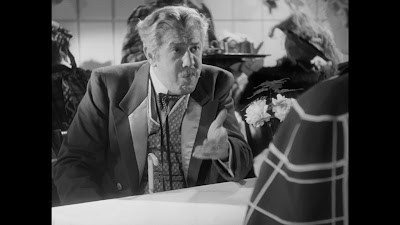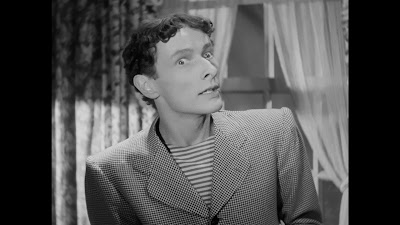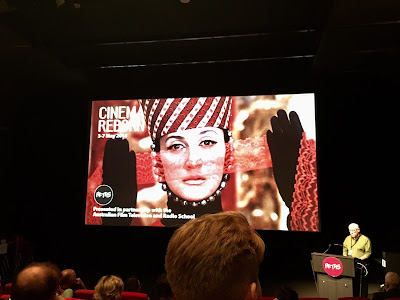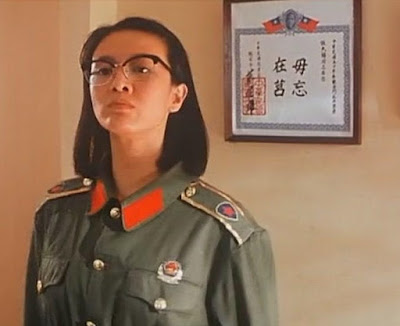Editor's note: This is the final in a four part series about the life and business times of legendary Hong Kong film producer Raymond Chow. Chow died in November 2018. The first part can be found if you click here the second if you click here and the third if you click here. John Snadden is a Melbourne cinephile, film distributor and writer with a longstanding interest in Chinese cinema. His notes on new Chinese films can be found throughout the Film Alert 101 blog.
Not surprisingly, by the early 2000s Peter Chan had left Golden Harvest and had co-founded a mainland company which went on to produce some of China's best films of that period, including Wuxia (aka Dragon), a Donnie Yen martial-arts/murder mystery and the Jet Li, Andy Lau historical epic, Warlords.
 |
| Bruce Lee and Raymond Chow |
The second half of the 1990s saw dark clouds gathering ominously on the horizon. They were to break on a number of fronts and eventually affect the long-term futures of Golden Harvest and Raymond Chow.
The painful irony of these coming years was to be these events were completely out of the hands of any one at Golden Harvest.
But before we get to that, I think the following is worth relating. These facts, as such, have been culled from various sources, plus some contemporary media coverage. I'd heard about this “disagreement” at the time and watched it unfold with particular interest.
My father, who was no slouch as a businessman, once told me how some large, well run international corporations can reach a point where they seem to run themselves (he was talking about the UK-based Swire Group), and where owners and senior managers can become totem figures.
The very successful Raymond Chow could never be described as a totem figure. He was hands on and he knew everything about the Golden Harvest Company. In mid-1996, he was on a stop-over in Melbourne and whilst reading one of the city's tabloids noticed an advert for a special season of the Cantonese language film, Rumble in the Bronx, being screened at a suburban independent cinema. Chow made some enquiries and learnt the theatre owner had hired the movie from a local Chinese cinema proprietor, who, as it turned out, didn't hold the distribution rights for this Jackie Chan film.
Raymond Chow informed the cinema owner he would have to pay a hefty fine to Golden Harvest, plus a standard fee if he wanted to continue screening Rumble in the Bronx,The Chinese theatre owner became involved and the situation soon devolved into a 3-way stand-off, with the HK entrepreneur threatening to take the print from both exhibitors. Each party could see where this was potentially heading. Normally, an executive like Chow would pass this problem to his legal department - and then move on. But the co-founder of Golden Harvest wanted this dispute solved – quick smart! Albeit, at the same time he didn't want to further line the silk pockets of the local legal fraternity. Chow stayed in Melbourne and worked out an agreement between the film company and the suburban cinema owner (by this time the Chinese exhibitor had already incurred the wrath of Chow).
All this eventually came to light with the new advertising that the suburban theatre was forced to run when Rumble continued its limited engagement. A daily newspaper and assorted street press had great fun in highlighting the new publicity for a “film which wasn't allowed to be named, and a star whose name wasn't allowed to be shown.” The advertising flyers for this programme have become highly collectable.
By the late 1990s, the falling audience numbers for Cantonese films world-wide was becoming a long-term trend.The reality was the Hong Kong film industry was not in a downturn it was in decline. Golden Harvest wasn't producing as many feature films, and it was mostly Jackie Chan movies and one-off blockbusters (The Storm Riders, A Man Called Hero) which were keeping the company in the black.
But there was cause for optimism when it came to the large but untapped cinema-going market in mainland China. Golden Harvest's hierarchy was being encouraged by China's government to develop multiplexes throughout Southern China. The potential for growth was enormous. But at the same time, Raymond Chow wasn't in a big hurry to move the company's film production to China, mainly because the state censors regularly banned / severely cut movies from Hong Kong film-makers.
In 1998, Golden Harvest's co-founder, Leonard Ho, died suddenly. It was a huge shock to all at the company – and especially Raymond Chow. Ho had shunned the limelight during his career, but with Chow they were the driving forces behind the success of Golden Harvest. Raymond Chow had lost a business partner and a close friend.
In what must have seemed like a 1-2 punch, the same year saw Hong Kong's new Communist rulers fail to renew the lease on the Diamond Hill property. Instead, a public housing development was to be built on the studio acreage. For a business operation this size there was nothing in Hong Kong even comparable, let alone available. It would have been easier to relocate Golden Harvest to Southern China. But Raymond Chow wasn't yet ready to take this leap of commercial faith.
Only a small number of films were produced by Golden Harvest in the following years. In 2003, My Lucky Star, a Canto comedy-drama, was officially the final movie made by the studio.
 |
| My Lucky Star |
By the early 2000s, rumours had begun circulating about the possible sale of the Golden Harvest Company. It was strongly suggested the likely buyer would be a mainland businessman. Once this prospective sale became public, Raymond Chow enthusiastically promoted the business as being the future for mainland Chinese film production and exhibition. It was also around this time that Run Run Shaw was seeking buyers for the Shaw Brothers Film and TV studio.
Times were definitely a-changing....and both entrepreneurs knew they wouldn't be playing major roles in the new corporations. These industry titans were wise enough to know when to leave. Each had witnessed the ravages of Mao's Cultural Revolution, and they understood the arbitrary nature of China's one-party rule. It was a world where policy changes for political aims ran roughshod over sound commercial business practice and long-term planning.
In 2007, Raymond Chow sold his shareholding in Golden Harvest to Wu Kebo, the head of a mainland media business. Mr Wu is one of a new breed of Chinese entrepreneurs. The company now wore the awkward title “Orange Sky Golden Harvest”. Wu Kebo promised to bring back the banner years of Golden Harvest, with a slate of prestigious films to be produced in the next 12-18 months. It was to be an announcement he would trot out regularly in the coming years though in the result there were hardly any films made.
In the end, the figures speak for themselves: between 1990-2007, Golden Harvest
produced and released approximately 120 feature films, and between 2007-2016, Orange Sky Golden Harvest produced and released one feature film, a comedy.
Since 2013, Orange Sky Golden Harvest (OSGH) has been badly affected by the slowdown of film exhibition in China (not a good time to be building cinemas). The latter mostly as a result of the CCP reducing the quota on Hollywood films being allowed into the Middle Kingdom, and a renewed emphasis on heavy censorship of all new releases. These party diktats had brought the once thriving commercial sector to a near standstill.
In 2017, the Dadi Group, China's second largest cinema chain, purchased all the OSGH theaters on the mainland.This left Wu Kebo's company with a handful of cinemas in Hong Kong, Taiwan and Singapore. The long-established Golden Village partnership also came to an end that year, when OSGH bought out the Australian partners in what had been an acrimonious business transaction.
With the recent poor performance of OSGH, one has to ask: Would OSGH be a better business if Raymond Chow had stayed on after the sale? Who really knows!? But, I suspect, Chow might offer a philosophical answer to such a question and that could be: “Where decline is part of the business cycle – so is renewal.”
In a way, this company has now gone full circle and is again a small player, but this time in the world's fastest growing region. Whether OSGH has the talent and financial nouse to become once again a major entity in world cinema – is something we will have to just wait and see.
































